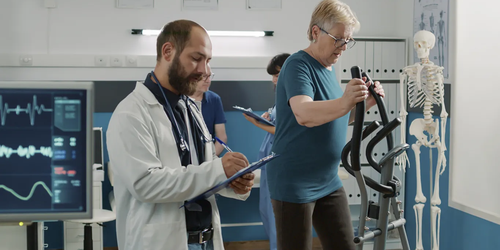Allied Health Professions Overview
The Association of Schools of Allied Health Professions defines allied health as the segment of the health care field “that delivers services involving the identification, evaluation and prevention of diseases and disorders; dietary and nutrition services; and rehabilitation and health systems management.”
There are five million allied health care providers in the United States, who work in more than 80 different professions and represent approximately 60% of all health care providers. The number of allied health care providers is likely to grow as jobs in the health care industry will grow from 15.6 million to 19.8 million between 2010 and 2020. An increasing number of those jobs will require people with bachelor’s and graduate degrees.
Some allied health care providers work collaboratively with other providers, including physicians, nurses, dentists and pharmacists. They may play roles in evaluating and assessing a patient’s needs, keeping the physician and others informed of the patient’s progress and caring for the patient. Others work independently as specialists in exercise, nutrition, health education, speech and daily function.
The allied health professions fall into two broad categories: technicians (assistants) and therapists/technologists. Technicians are trained to perform procedures, and their education lasts less than two years. They are required to work under the supervision of technologists or therapists. Cardiovascular technicians, ophthalmic medical technicians and medical assistants are examples of careers in this category.
The educational process for therapists or technologists is more intensive and includes acquiring procedural skills. In addition, students learn to evaluate patients, diagnose conditions, develop treatment plans and understand the rationale behind various treatments in order to judge their appropriateness and potential side effects. Educational curricula teach students to evaluate patients’ responses to therapy and make appropriate decisions about continued treatment or modification of treatment plans. Anesthesiologist assistant, neurodiagnostic technologist and pathologists’ assistant are three examples of allied health careers in this category.
The following professions are included in allied health:
- Anesthesiologist Assistant
- Athletic training
- Audiology
- Cardiovascular perfusion technology
- Cytotechnology
- Dental hygiene
- Diagnostic medical sonography
- Dietetics
- Emergency medical sciences
- Health administration
- Health information management
- Medical technology
- Nuclear medicine technology
- Occupational therapy
- Physical therapy
- Physician assistant
- Radiation therapy technology
- Radiography
- Rehabilitation counseling
- Respiratory therapy
- Respiratory therapy technology
- Speech-language pathology
Related Careers

Anesthesiologist Assistant
Salary: $120K - 200K

Cardiopulmonary Rehabilitation Specialist
Salary: $18K - 30K

Community Health Worker
Salary: $38,180

Genetic Counselor
Salary: $91,318

Healthcare Documentation Specialist
Salary: $21K - 50K

Health Care Interpreter
Salary: $43,000

Health Information Manager
Salary: $20K - 75K

Medical Assistant
Salary: $30,548

Medical Coder
Salary: $45K - 65K

Medical Dosimetrist
Salary: $96K - 123K

Medical Illustrator / Animator
Salary: $62K - 85K

Medical Librarian
Salary: $65,000

Medical Science Liaison
Salary: $169,541

Neurodiagnostic Technologist
Salary: $41,260

Nurses Aide / Assistant
Salary: $25,620

Orientation & Mobility Specialist
Salary: $35K - 80K

Orthotist and Prosthetist
Salary: $33K - 95K

Pathologists’ Assistant
Salary: $89,999

Perfusionist
Salary: $65K - 135K

Respiratory Therapist
Salary: $62,222
Lynn Brooks, a former health care human resources executive and President of the Health Professions Network, reviewed this overview.